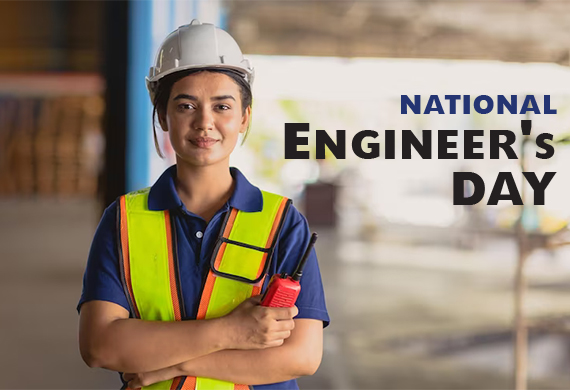
This is What Women Leaders have to Say on National Engineer's Day
By: WE Staff
On National Engineer’s Day we take stock of how far women engineer’s have come over the past few years. We also delve into the key challenges faced by engineering graduates in India and how to bridge the gap for industry readiness.
Insights from industry experts shed light on the path to success for aspiring engineers.
National Engineers' Day is a cherished annual observance in India, falling on September 15th, in honour of Sir Mokshagundam Visvesvaraya's birthday. This distinguished engineer and statesman's legacy symbolizes the nation's enduring gratitude to its engineering community. The day stands as a heartfelt tribute to engineers whose unwavering commitment has been instrumental in propelling India's progress and development.
It's an occasion to celebrate their remarkable ingenuity, astute problem-solving abilities, and their pivotal role in shaping the trajectory of the nation. National Engineer Day is a reminder of their indispensable contribution to innovation and a brighter future for India.
Engineering: A Promising Path
Engineering has always been regarded as a promising career choice in India. The allure of pioneering technologies and the prospect of creating a brighter future draw countless young minds into this field. As we celebrate National Engineers' Day, it's crucial to address different perspectives that showcase the evolution of the field.
To shed light on this matter, we turn to the perspectives of women in the industry and echoing job alert waiting for them in future. These women leaders share their experiences and thoughts on the challenges faced by engineering graduates in India.
Underrepresentation and Determination: A Personal Journey
The year was 1943, when A Lalitha graduated with a degree in electrical engineering, making her the first woman engineer in India.
Gradually, women followed A Lalitha’s example and forayed into the field. However, their inclusion in the industry was gradual.
Preeti Agarwal, CTO and co-founder, SecureThings.ai shares her personal journey as a young engineer back in the day, “Back in the 90s, when I was a student of Engineering, there were only four female students in my class of 40, indicating the underrepresentation of women in the field. Even so, I was confident that Engineering was the right profession that would allow me to make a difference in the World. Back then, with only a few software MNCs in India, career and growth opportunities were limited. I was lucky to get my first job opportunity at a tier 1 company in 2002. The journey was rocky, and I had to stand tough to stay in the game and succeed. After 20 years of experience, I Co-Founded SecureThings - an Automotive Cybersecurity startup.
Women such as Preeti have been pioneers in boosting women’s inclusion in the field of engineering. Today we see a record number of women choosing BTech degrees. According to Ministry of Education, the number of women pursuining B-Tech degrees in National Institutes of Technology nearly doubled between 2016 and 2021. This only attensts to the fact that engineering is a well-suited field for women.
Preeti exaplains, “Today, Engineering is the best career option for anyone. What is better than using cutting-edge technology to invent the future? From Quantum computing, generative AI, ML, 5G networks, and autonomous vehicles. The future for engineering is absolutely promising, with the increasing technological demands across all sectors. Today and in the future, men and women engineers must work hand in hand to answer the needs of the World. Happy Engineers Day!”
Preeti’s exuberance is palpable and also highlights the pride that engineers feel for the remarkable work that they do.
Dedication &Brilliance of Women Engineers
Gunjan Malhotra, Director of Komaki Electric Vehicle Division, echoes Preeti’s thoughts. Speaking about the rise of women in the field of engineering, she says, “The ascent of Indian women in the engineering sector is a testament to their unwavering dedication and brilliance. They have embraced the challenges and soared above them, proving that gender is no boundary when it comes to innovation and excellence.
These incredible women engineers are forging a path of progress, their contributions leaving an indelible mark on the field. Their diverse perspectives, tenacity, and groundbreaking work drive technological advancements and transform the engineering landscape.”
She also adds, “What's most inspiring is the broader societal impact of their rise. It signifies a shift towards a more inclusive and equitable society, where opportunities are boundless, and the job market is speedily embracing inclusivity to address discriminatory issues.
This journey is not just about individual success but a collective triumph, a reflection of the changing narrative in India. It's a story of empowerment, resilience, and hope, showing the world that Indian women are rising to conquer new horizons, leading the way into a future where gender disparities are a thing of the past and the reign of talent and determination is absolute.”
Gunjan’s thoughts highlight the stellar work being done by Indian women in the field of engineering. Be it leading legacy companies across the globe or building new-age ventures spearheading innovation, women engineers are truly making a mark in the tech landscape.
Educationalists’ Role in Supporting Women Engineers
Up until a few yeas ago, STEM was considered a man’s field. In fact, this misconception was fed to students very early on in their lives, i.e. right from school. However, visionary educationalists have been at the forefront of motivating young women to take up STEM fields and carve a niche for themselves.
Alka Kapur, Principal, Modern Public School, shares her thoughts with us, “As a teacher, witnessing the remarkable rise of Indian women in the engineering sector fills me with immense pride and hope.
What's truly inspiring is how they navigate challenges with grace and resilience, proving that gender is not a limitation but a source of strength. They bring diverse perspectives, creativity, and empathy to engineering, enriching the field and driving progress.
I believe that the rise of Indian women in engineering is a testament to their individual achievements and a reflection of the evolving societal mindset. It's a beacon of change, a symbol of equality, and a promise of a brighter, more inclusive future.
As educationists, it's our privilege to nurture and support these young women on their journeys. We must continue encouraging and empowering them with the knowledge and skill set, ensuring they have the tools and confidence to reach even greater heights. Now, we are shaping a world where talent knows no gender, and every aspiring engineer, regardless of gender, can rise and shine.”
Industry Ready Engineering Graduates: An Urgent Need of the Hour
While women have been making a mark in engineering and strengthening the overall engineering landscape globally, yet challenges remain. A major one being, scarcity of industry ready engineering graduates.
Prasanna Anireddy, VP, Engineering, Progress shed light on the overarching challenge, “India indeed has a large population of engineering talent, but the quality of this talent needs a closer look. I feel that the current education system in India does not prioritize the development of practical skills, leaving graduates with a qualification that lacks hands-on knowledge. Take for example a computer science degree. Most graduates acquire theoretical knowledge of basic programming and algorithms but have not been able to transfer that knowledge to a real-world setting. Part of the problem is the college curriculum in most institutions, which has not been revised often enough to keep up with the rapidly evolving industry.”
Prasanna also believes that the problem might lie beyond the curriculum. She explains, “The problem may also lie in professionals’ lack of genuine interest in engineering. Engineering is arguably the most commonly pursued career track in the country. However, the majority of the students pursue it as an outcome of groupthink. Very often, the perceived extensive industry opportunities and potential future pay scale push parents to encourage their child to pursue it while the child may not be truly interested in it. In this case, the student gets through the degree, meeting the bare minimum requirements which leads to subpar skills upon graduation.”
Bridging the Gap: A Collective Effort
Prasanna also sheds light on how to address the skill gap. “To address the demand-supply and skills gaps, a comprehensive approach is needed. Educational reforms, a cutback in intake in each graduating class, stronger requirements for institutions, and imparting of skills in the curriculum are needed in the education sector. For outside-campus placements, graduates must be aware of the diverse opportunities and acquire the skills necessary in the job market”.
As we celebrate National Engineers' Day, it's evident that the path from engineering classrooms to industry readiness is laden with challenges. The insights from industry experts like Preeti Agarwal and Prasanna Anireddy highlight the need for a concerted effort to address the gaps.
Educational reforms, industry-academia collaborations, and a shift towards practical, hands-on learning are essential. Students must also be encouraged to pursue engineering out of genuine passion rather than societal pressure, and a fast job approach ensures a higher level of commitment and enthusiasm.
Let us salute engineers on this special day for their relentless pursuit of knowledge and innovation. By working together to bridge the gap between education and industry readiness, we can ensure that future generations of engineers are well-prepared to meet the challenges of a rapidly evolving world. Happy National Engineer Day!
Most Viewed
- 1 Women's Health Startup HerMD Closing Doors Amid Industry Challenges
- 2 5 Famous Women in Indian Armed Forces
- 3 Saudi Women No longer Require Male Permission for Clothing Choices, says Prince MbS
- 4 Kolkata Medtech Startup Innovodigm Raises Rs 5.5 Crore Seed Funding Led by IAN Group
- 5 Yamunanagar's Kashish Kalra Honoured after Securing 111th Rank in UPSC Civil Services Exam
- 6 Madurai Appoints Its First Woman Corporation Head
- 7 IAS Vijayalakshmi Bidari Appointed as the new Nagpur Divisional Commissioner
- 8 American Entrepreneur Lucy Guo Overtakes T Swift to become Youngest Female Billionaire
- 9 ICC Women's World Cup 2025 Trophy Showcased at Indore's Holkar Stadium
- 10 Aparna Saxena's Beauty Venture AntiNorm Launches in India
- 11 Vidya Nataraj Co-Founded BlueStone Jewellery & Lifestyle files IPO
- 12 5 Women Freedom Fighters of India
- 13 Dr. G Krishnapriya appointed as CEO for Trichy
- 14 M3M & Sirona Partner to Introduce Menstrual Hygiene Vending Machines in 15 Locations
- 15 Punjab Govt launches SHE Cohort 3.0 Supporting Tech-led Women Startups
- 16 Indian origin Lawyer, Sweena Pannu appointed as the US New Superior Court Judge
- 17 The Aurora Tech Award recognizes 4 Indian Women-led Startups
- 18 Kerala's Republic Day parade featured an all-female tableau
- 19 Manisha Kabbur Becomes Karnataka's First Woman International Karate Coach
- 20 Director K. S. Ravikumar's Daughter Maalica Ravikumar Launches Life Coaching Company 'Evergrowth Academy' for Women
- 21 Leezu's Raises Pre-Seed Funding to Accelerate Growth in Sexual Wellness Industry
- 22 Sattu: Super-easy summer drink for PCOS gut healing
- 23 Swathi Nelabhatla creates Sitha App, India's First Women-Exclusive Gig Platform
- 24 7 Timeless Female Kathak Dancers & their Iconic Legacies
- 25 Meet 7 Iconic Women Architects of Modern India & their Most Impactful Work
- 26 This Woman-led Insuretech Startup is Helping Bridge the Education Financing Gap in India
- 27 Women Leaders Share Lessons Learnt from India Women's WC Win
- 28 5 Enterprising Women Founders Powering Singapore's Tech & Innovation Landscape
- 29 4 Women. 4 Stories. One Vision for Smarter, Stronger Healthcare
- 30 Global Gender Gap Narrows to 68.8%, But Full Equality 123 Years Away: WEF Report 2025
- 31 Changemakers: 7 Women Entrepreneurs Taking the Make in India Movement Forward
- 32 Meet Lucy Guo, The Youngest Self-Made Female Billionaire Disrupting Tech
- 33 How Women are Driving India's Festive Online Shopping Surge






